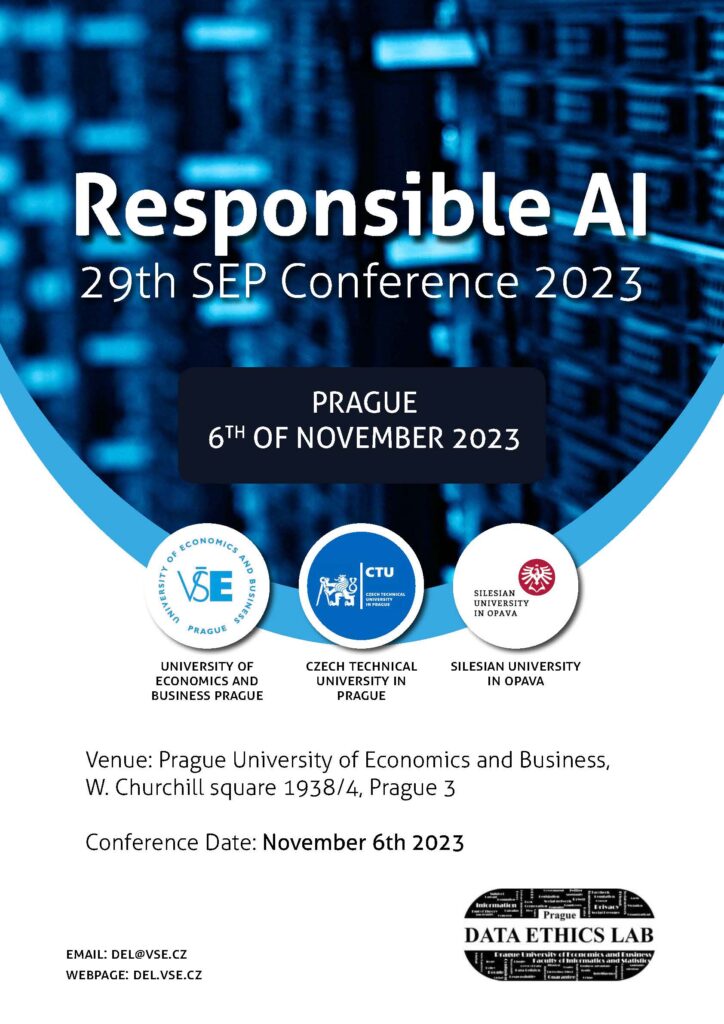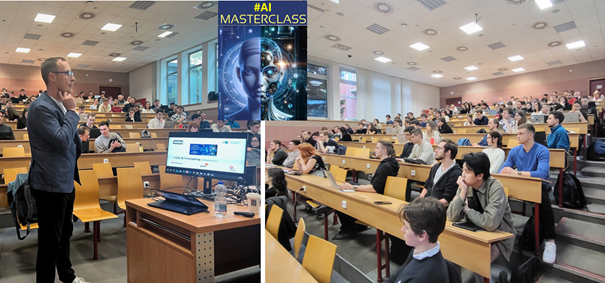SEP 2023 Conference: Responsible AI

The theme of this year’s SEP 2023 conference is:
Responsible AI, technology for good!
Date: Monday, November 6th, 2023, 2-6 pm, Free Entry, Innovation Week at the University of Economics, Prague
Location: Aula NB A, VŠE Praha, W. Churchill Sq. 1938/4, 130 67 Prague 3-Žižkov
Registration: students of VŠE here, the public on site
Conference Agenda
14:00 – 14:15 Keynote: Responsible AI conference
Special guest of Prague Data Ethics Lab:
Prof. Petr Doucek, Vice-Dean, Faculty of Informatics and Statistics, VŠE Praha
14:15-15:00 Technological insight: An overview of the Responsible AI field
Ing. Richard A. Novák, Ph.D.,
Chairman Prague Data Ethics Lab,
CEO OmniCrane
In the introductory lecture, we will present the current state of knowledge and methods in AI, such as classical ML methods (decision trees, cluster analysis, regression, Bayesian statistics…), neural networks (NN), large-scale language models (LLM), evolutionary algorithms and others. We will see the current trends and applications of these methods in different fields of human activity such as Industrial Automation vs Creative Work, Corporations vs Startups and more. We will end the talk with a demonstration of methods suitable for Ethical AI design and then Explainable AI tools (xAI), i.e. how to describe and communicate to users how AI “black boxes” work.
15:00 – 15:20 Ethical insight: People involved in AI, Automation and Autonomy, two Ethical concepts that shape the future
Ing. Mgr. Tomáš Sigmund, Ph.D, Vice-Chairman Prague Data Ethics Lab
In today’s rapidly evolving technological world, the impact of automation on human autonomy is increasingly discussed. This talk focuses on the complex relationship between automation and autonomy, exploring how one sphere affects the other and what the implications of this relationship are for the future of work, ethics and society. While automation brings efficiency and increases productivity, it can also lead to job loss and reduced human autonomy in decision-making processes.
This presentation will explore several key issues: How can automation support autonomy and where does it threaten it? What are the ethical and social implications of this relationship? And how can we create a balance that maximizes benefits and minimizes risks? The aim is to provide a comprehensive view of this pair of concepts and offer suggestions on how a harmonious coexistence between automation and human autonomy can be achieved in the coming decades.
15:20 – 15:45 Use Case: Predictive Maintenance in Telematics
Doc. Tomáš Tichý, Ph.D., MBA, CTU FD, Laboratory of Traffic Control and Modelling
RNDr. Petr Máša, PhD., & Ing. R.A.Novák, Ph.D. & Ing. J.Brož, CTU FD
Applying AI methods to large data sets to solve a problem that has positive benefits for society as a whole. Presentation of the first indicative results from a TAČR research grant focused on predictive maintenance of telematics equipment in Prague tunnels.
15:45-16:00 Coffee break
16:00 – 16:20 Sociological perspective: How AI affects society and its members
Mgr. Kamil Matula, Ph.D. and Mgr. Anna Novotná, Ph.D., Silesian University Opava
The issue of artificial intelligence is very popular. It is expected to take over much of the control of common manufacturing processes, code design, parts of teaching and most mechanically performed operations in the near future. At the same time, it is little understood that it already controls our information flows and much of the information environment. As a society, we have long used it to sort information, whether in spam filters or in search engines and social networking algorithms. We know that while we need its functionality, it can also have a detrimental effect on the individual and their information behavior, which manifests itself not only physically but also psychologically. We would like to reflect in this talk on how it actually helps us and how much it potentially harms us.
16:20 – 16:40 Principles of law: The future is digital: or maybe not
BcA. et Bc. Hynek Trojánek / Iuridicum Remedium
A slightly different view of the downsides of data explolosis. The trend of moving activities and communications into digital space is not only eroding privacy, but also reinforcing digital exclusion: people who cannot or will not use certain digital technologies are literally falling out of society. As a result, calls for a ‘right to analogue’ are growing in some countries. What if the digital prophets were wrong? What if the future is also primarily analogue?
16:40 – 17:00 Community insights: The power of human communities vs Facebook algorithms
Ing. Jiří Korčák, VŠE Praha / Prague Data Ethics Lab
Insight into how the strength and resilience of different communities can be measured and how the environments of different social networks differ. Discussion of the influence of algorithms that moderate the perception of reality in different social bubbles and in particular how the view of reality differs between the so-called snowflake generation and people who grew up in an era without social networks.
17:00 – 18:00 Discussion and Networking
Event Description:
Responsible AI (rAI). Good practice in rAI then involves the interplay of multiple disciplines such as computer and mathematical sciences, sociology, psychology, philosophy, law and many others.
If, like us, you are interested in the balanced perspectives of engineers, philosophers, sociologists, lawyers, and economists, come to this year’s SEP 2023 conference to hear how different professional groups view Responsible AI.
On behalf of the conference preparatory team:
Dr. Richard A. Novak, Dr. Tomas Sigmund, Dr. Kamil Matula and Dr. Anna Novotná

Proceedings:
Proceedings as a Book of abstracts has been published and is available.
Event Photo:
